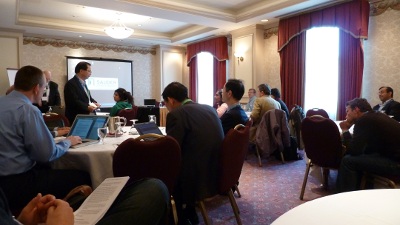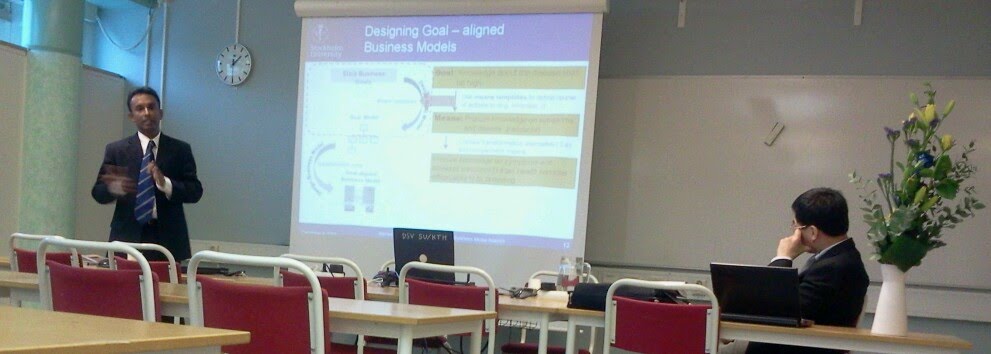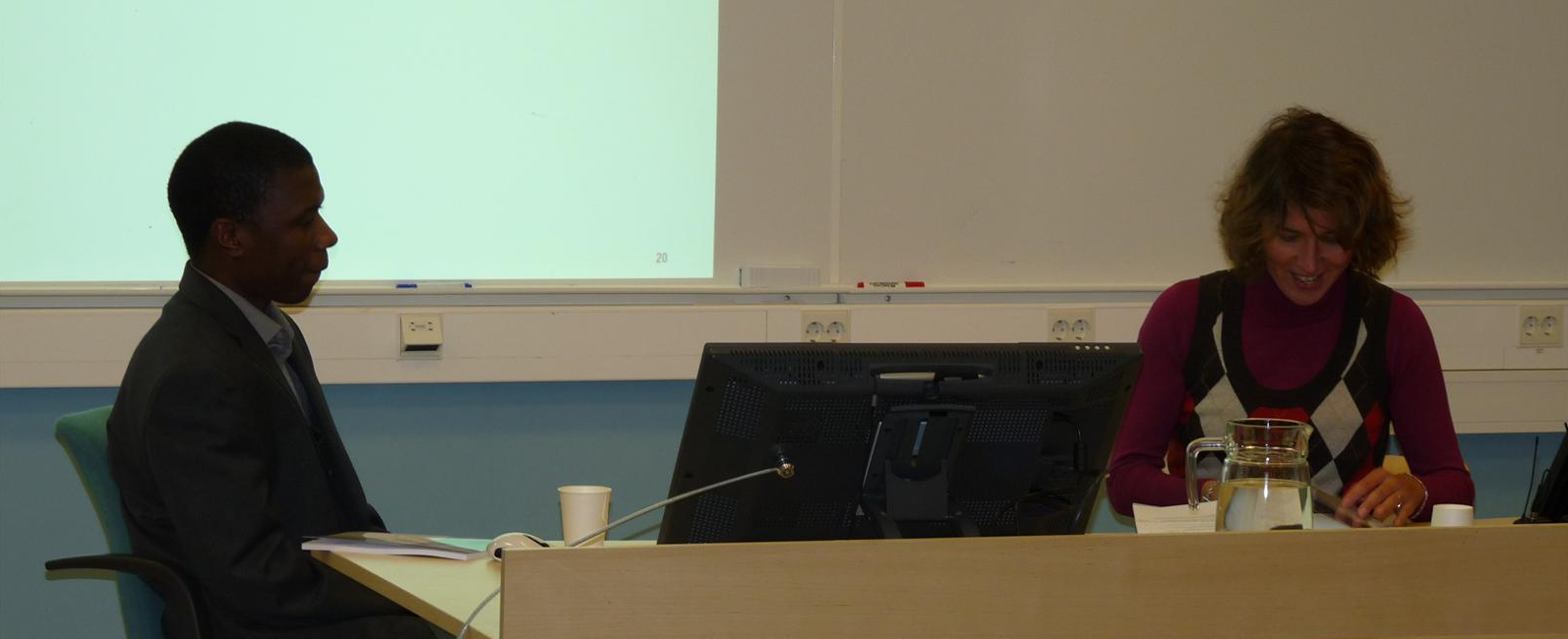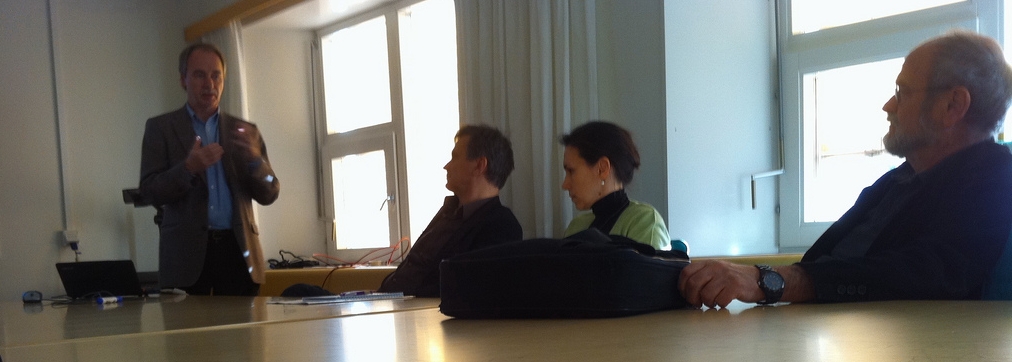On 23 February, I gave a presentation on Unified Service Theory and perspectives on services as part of a study circle on service systems. Unified Service Theory views services as a special kind of production process where the customer contributes with her resources. This approach contrasts to earlier attempts to distinguish service through special properties like intangibility and perishability. The seminar also discussed additional perspectives on services based on the idea that the notion of service is best explained by identifying and associating a number of related concepts, including service processes, service resources and service agreements.
SISA Conference
SISA, the Swedish Information System Academy, will give a conference in Örebro in May.
Programtext: INFORMATIK – Universitetens bäst bevarade hemlighet.
Arrangörer: SISA genom Örebro universitet.
Sponsorer:
Datum: 10-11 maj, 2011.
Plats: Örebro universitet (Musikhuset).
Syftet med konferensen är att synliggöra Informatik i Sverige. Konferensen bygger därför på att gemensamgöra informatikämnet mellan de olika lärosätena i Sverige samt att vi ska lära oss promota ämnet såväl internt (på de egna lärosätena) som externt (i samhället och media).
Seminar with Göran Goldkuhl on Practice Research
On 18 February, Göran Goldkuhl gave a presentation on practice research. Göran discussed practice research from an ontological as well as epistemological perspective. The discussion was lively ranging from Activity Theory over KPIs to Habermas, with a memorable remark from Göran, “some critique of Habermas acknowledges that life is more than an academic seminar”. Gustaf Juell-Skielse and Erik Perjons also contributed with their experiences of practice research.
Seminar on BPM in crisis
Today, Ilia Bider from IbisSoft AB gave a seminar on the current state of BPM based on discussions at the BPM 2010 conference. Ilia outlined a number of trends, including the shift from an assembly line metaphor to that of a construction site. He also discussed the tension between agility and stability in BPM and called for a stronger theoretical foundation of BPM.
Tharaka Ilayperuma PhD Dissertation
Today, Tharaka Ilayperuma defended his PhD thesis “Improving E-Business Design through Business Model Analysis”. The opponent was William Song from Durham University, and the examination committee consisted of Marianne Nilsson from Stockholm University, Eva Söderström from Högskolan Skövde and Henrik Hansson from DSV. Paul Johannesson and Jelena Zdravkovic have been supervisors.
William gave a very thorough opposition including more general as well as very specific questions, ranging from the meaning of e-business to the role of the Semantic Web in business models.
Abstract
To a rapidly increasing degree, traditional organizational structures evolve in large parts of the world towards online business using modern Information and Communication Technology (ICT) capabilities. For efficient applications of inter-organizational information systems, the alignment between business and ICT is a key factor. In this context, business analysis using business modelling can be regarded as a first step in designing economically sustainable e-business solutions.
This thesis examines how business modeling can be used to improve e-business design. We examine how business stakeholder intentions and different objectives of business collaborations can be used to obtain an explorative business model that can be used as a basis for designing e-business solutions. The thesis proposes a set of artifacts for business modeling and e-service design. In regard to business modeling, we propose methods that consider internal aspects such as strategic intentions of actors and external aspects such as business collaborations among them. Considering stakeholder intentions, we introduce a method to design business models based on goal models. A set of templates for designing goal models and a set of transformation rules to obtain business models based on goal models are proposed. To further improve business models considering business collaborations, we suggest a classification of business transactions that considers underlying business objectives of business collaborations. Utilizing the suggested business transactions, we then propose a method to improve business modeling. Finally, we propose a method for designing e-services using business models. The methods suggested support business modelers as well as process and services designers in executing their tasks effectively. The methods have been assessed through applications in two cases.
Mturi Elias Licentiate
A Universal Business Process Model Repository. Mturi Elias presented his licentiate on business process model repositories. The photo shows Mturi and Jelena Zdravkovic who was the opponent. Louise Yngström was the examiner, and Paul Johannesson the supervisor.
Abstract
Business Process Management (BPM) has become one of the most important instruments to help modern organizations meet their business goals and achieve competitive advantage. Business process modelling plays a vital role in BPM. Business process modelling is a complex, time-consuming and error-prone task. However, the efforts made to model business processes are seldom reused beyond their original purpose. Rather than modelling business processes from scratch, analysts can derive process models by redesigning existing ones. Business process model repositories provide a central location for storing and managing process knowledge for future reuse.
This thesis starts with the observation that the existing process model repositories for supporting process model reuse suffer from several shortcomings that affect their usability in practice. Firstly, most existing process model repositories are proprietary — they are not publicly open. Therefore, they can only be enhanced or extended with new models by the owners of the repositories. Secondly, it is difficult to search and navigate across repositories because they follow different business and process classification schemes. Thirdly, process models are not goal related, therefore making it difficult to gain an understanding of the business goals that are realized by a certain model. Finally, some repositories have limited scope, meaning that they are domain specific.
Following a design science research method, this thesis addresses the above shortcomings by proposing a universal process model repository to store and manage process knowledge for future reuse. The proposed repository is grounded on three original and interrelated contributions: (1) a set of requirements that a process model repository should possess to increase the probability of process model reuse; (2) a business process metadata model for annotating process models to facilitate searching for process models, navigating the repository and understanding the process models; (3) a generic data model with a common process description format (language independent) for capturing and storing process models from different modelling notations. While the main objective of the research is to provide a design for a unified process model repository that is language independent and open to the public community, the above-mentioned contributions are the results of the work carried out towards the final results.
Göran Goldkuhl on Practical Inquiry
Today, Göran Goldkuhl gave a seminar on action research and its continuation into practical inquiry.
Action research is an established research approach in information systems. Such an approach is aiming at both 1) local intervention and improvement and 2) contribution to the scientific body of knowledge. The practical value outside the local practice is however seldom emphasised. It is therefore desirable to expand this kind of research to deal with general practice contributions. A research approach – practical inquiry – that goes beyond action research will be described at the seminar.
A Paper on Service Perspectives
At the workshop Conceptual Modelling of Services (CMS 2010), colocated with the 29th International Conference on Conceptual Modeling, I presented a paper that analysed the notion of services by identifying three service perspectives and explaining them using the REA ontology and Hohfeld’s classification of rights.

Peter Chen talks
The workshop included a quite similar paper by Geert Poels, who had also analysed the service notion using REA, where he kept very close to service dominant logic.
Abstract. The recent surge in the interest of services has brought a plethora of applications of the service concept. There are business services and software services, software-as-a-service, platform-as-a-service, and infrastructure-as-a-service. There is also a multitude of definitions of the service concept. In this paper, we propose not a new definition of service but a conceptual model of the service concept that views services as perspectives on the use and offering of resources. The perspectives addressed by the model are: service as a means for abstraction; service as means for providing restricted access to resources; and service as a means for co-creation of value.


